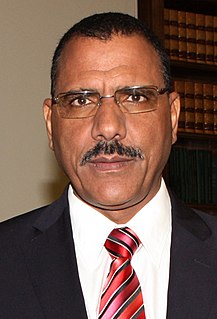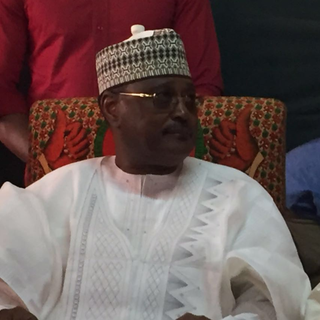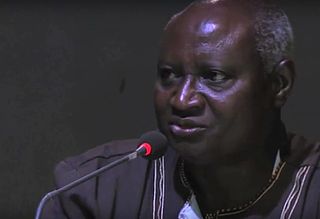
The music of Niger has developed from the musical traditions of a mix of ethnic groups; Hausa, the Zarma-Songhai, Tuareg, Fula Kanuri, Toubou, Diffa Arabs and Gurma and the Boudouma from Lac Chad.

Jean Rouch was a French filmmaker and anthropologist.

Rap Nigerien is a hip hop music style that first appeared in Niamey, Niger, at the end of 1998.

From 1990 to 1995, a rebellion by various Tuareg groups took place in Niger and Mali, with the aim of achieving autonomy or forming their own nation-state. The insurgency occurred in a period following the regional famine of the 1980s and subsequent refugee crisis, and a time of generalised political repression and crisis in both nations. The conflict is one in a series of Tuareg-based insurgencies in the colonial and post-colonial history of these nations. In Niger, it is also referred to as the Second or Third Tuareg Rebellion, a reference to the pre-independence rebellions of Ag Mohammed Wau Teguidda Kaocen of the Aïr Mountains in 1914 and the rising of Firhoun of Ikazkazan in 1911, who reappeared in Mali in 1916. In fact the nomadic Tuareg confederations have come into sporadic conflict with the sedentary communities of the region ever since they migrated from the Maghreb between the 7th and 14th centuries CE. Some Tuareg wanted an independent Tuareg nation to be formed when French colonialism ended. This, combined with dissatisfaction over the new governments, led some Tuareg in Northern Mali to rebel in 1963.

The Nigerien Progressive Party – African Democratic Rally is a political party in Niger. It was the leading political party of the pre-independence era, becoming the sole legal party of the First Republic (1960–1974). It was led by Niger's first President, Hamani Diori. After the end of military rule, the party reappeared as a minor parliamentary party led by Diori's son, Abdoulaye Hamani Diori.
Amadou Cheiffou is a Nigerien politician who was Prime Minister of Niger from 26 October 1991 to 17 April 1993, heading a transitional government. He has led the Social Democratic Rally (RSD-Gaskiya), a political party, since founding it in January 2004. Cheiffou was President of the Economic, Social and Cultural Council of Niger (CESOC) from January 2006 to February 2010, and he held the official post of Ombudsman from August 2011 to December 2015.

Mohamed Bazoum, is a Nigerien politician who is the current president of the Republic of Niger. He has been in office since 2 April 2021.

Seyni Oumarou is a Nigerien politician who was Prime Minister of Niger from June 2007 to September 2009 and President of the National Assembly of Niger from November 2009 to February 2010. He is from the west of the country and is a member of the Djerma ethnic group. Since November 2008, he has been the President of the National Movement for the Development of Society (MNSD). He unsuccessfully stood as a presidential candidate in 2011, 2016 and 2021. After years as an opposition leader under President Mahamadou Issoufou, he was appointed to the post of High Representative of the President in October 2016.
Hassoumi Massaoudou is a Nigerien politician who served in the government of Niger as Minister of Finance from October 2016 to January 2019. A leading member of the Nigerien Party for Democracy and Socialism (PNDS-Tarayya), he was Minister of Communication, Culture, Youth and Sports from 1993 to 1994, President of the PNDS Parliamentary Group from 1999 to 2004, Director of the Cabinet of the President from 2011 to 2013, Minister of the Interior from 2013 to 2016, and Minister of National Defense in 2016 and minister of Foreign Affairs since 2021.

The Tuareg Rebellion of 2007–2009 was an insurgency that began in February 2007 amongst elements of the Tuareg people living in the Sahara desert regions of northern Mali and Niger. It is one of a series of insurgencies by formerly nomadic Tuareg populations, which had last appeared in the mid-1990s, and date back at least to 1916. Populations dispersed to Algeria and Libya, as well as to the south of Niger and Mali in the 1990s returned only in the late 1990s. Former fighters were to be integrated into national militaries, but the process has been slow and caused increased resentment. Malian Tuaregs had conducted some raids in 2005–2006, which ended in a renewed peace agreement. Fighting in both nations was carried on largely in parallel, but not in concert. While fighting was mostly confined to guerrilla attacks and army counterattacks, large portions of the desert north of each nation were no-go zones for the military and civilians fled to regional capitals like Kidal, Mali and Agadez, Niger. Fighting was largely contained within Mali's Kidal Region and Niger's Agadez Region. Algeria helped negotiate an August 2008 Malian peace deal, which was broken by a rebel faction in December, crushed by the Malian military and wholescale defections of rebels to the government. Niger saw heavy fighting and disruption of uranium production in the mountainous north, before a Libyan backed peace deal, aided by a factional split among the rebels, brought a negotiated ceasefire and amnesty in May 2009.
The Cinema of Niger began in the 1940s with the ethnographical documentary of French director Jean Rouch, before growing to become one of the most active national film cultures in Francophone Africa in the 1960s-70s with the work of filmmakers such as Oumarou Ganda, Moustapha Alassane and Gatta Abdourahamne. The industry has slowed somewhat since the 1980s, though films continue to be made in the country, with notable directors of recent decades including Mahamane Bakabe, Inoussa Ousseini, Mariama Hima, Moustapha Diop and Rahmatou Keïta. Unlike neighbouring Nigeria, with its thriving Hausa and English-language film industries, most Nigerien films are made in French with Francophone countries as their major market, whilst action and light entertainment films from Nigeria or dubbed western films fill most Nigerien theatres.
Tetserret is a Western Berber language spoken by the Ait-Awari and Kel Eghlal Tuareg tribes of the Akoubounou (Akabinu) commune in Niger. This main speech area is located between Abalak, Akoubounou and Shadwanka. The variant spoken by the Kel Eghlal is called taməsəɣlalt. The Tamasheq equivalent shin-sart / shin-sar / tin-sar is used in some older literature. Popular understanding among some Ait-Awari derives the name tet-serret, and its Tamasheq equivalent shin-sart, from expressions meaning 'the (language) of Sirte'.
Bankilaré is a village and rural commune in Niger. Bankilaré commune, centered on the town of the same name, is in Téra Department, Tillabéri Region, in the northwestern corner of the country. The town lies 60 km north of Departmental capital Téra, and around the same distance from the Burkina Faso border and the Mali border.
Kolleram is a village and rural commune in the Mirriah Department of the Zinder Region of Niger.

Adamou Idé is a Nigerien poet and novelist.

Lieutenant General Salou Djibo is a Nigerien Army officer. After President Mamadou Tandja's attempts to remain in power after the end of his term, Djibo led the military coup of 18 February 2010 that ousted Tandja, after which he became the head of the Supreme Council for the Restoration of Democracy. The Supreme Council returned power to a new civil government after the 2011 elections.
Rhissa Ag Boula is a Nigerien Tuareg politician and former leader of rebel factions in both the 1990–1995 and the 2007–2009 Tuareg based Insurgencies. He was Nigerien Minister of Tourism from 1996-1999, and again from 1999-2004. His arrest on murder charges in 2004 precipitated armed conflict between his supporters and the Nigerien government. A political leader following the 1995 peace, he again joined a rebel faction from abroad in 2007, creating his own faction from abroad in 2008, and joining the peace process in 2009. In 2010 he was again arrested after returning to Niger.

Brigi Rafini is a Nigerien politician who served as the Prime Minister of Niger from 2011 to 2021. A native of Iférouane in Agadez Region and an ethnic Tuareg, Rafini was Minister of Agriculture in the late 1980s and Fourth Vice-President of the National Assembly of Niger from 2004 to 2009. He was appointed as Prime Minister after Mahamadou Issoufou took office as President on 7 April 2011. He is also notably the first Tuareg in office.
The Nigerien National Guard, formerly known as the Forces Nationales d’Intervention et de Securité (1997-2011) and Garde Republicaine (1963-1997), is a paramilitary corps of the Armed Forces of Niger under the control of the Ministry of Interior, Public Safety and Decentralization. It is headed by the superior commander of the national guard.

The Nigerien Progressive Union was a political party in Niger led by Georges Condat.










